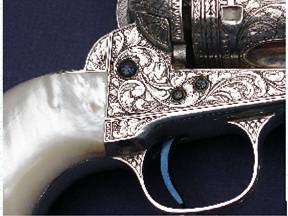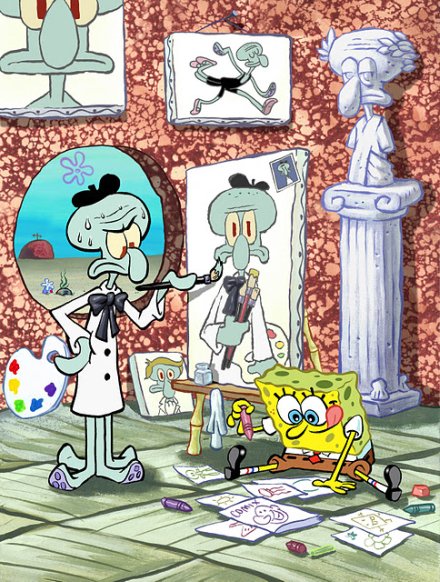The Art of Weaponry
Response to comment [from a Christian]: "I want a katana sword..."
Japanese Katana vs European Longsword Lk 22:36
Response to comment [from a pagan]:
Bringin'NoLight.

Response to comment [from a Christian]: "Designing and making weapons is not an "art form". It's a craft..."
Using them is an art form.
"Using them is a skill. Not an 'art form'. Just as using language is a skill ... that not everyone is especially good at."
Semantics.
 Skills are the building blocks of what one
day may become an art form. That's why they
call martial artists for example--martial
artists. You work at it for years and one
day you become an artist--one who creates
something new from his/her skill set.
Skills are the building blocks of what one
day may become an art form. That's why they
call martial artists for example--martial
artists. You work at it for years and one
day you become an artist--one who creates
something new from his/her skill set.
It has been said that it takes 10,000 hours
to be good at anything. If you've invested
10,000 hours in any given venture, you're
going to be pretty at it.
Response to comment [from a pagan]:
Lightbringer Bringin'NoLight.
 "Fine demonstration serpentdove."
"Fine demonstration serpentdove."
Lightbringer: "We all
try to garner attention in some manner, some
more than others..."
SD: Bringin'NoLight

Lightbringer: "Fine demonstration
serpentdove."
You're an attention seeker?


Response to comment [from a Christian]:
"Except that 'art' is not the pursuit of
being "really good" at things (the pursuit
of excellence). And it never has been,
throughout all human history."
Semantics.
 You can be good at a thing but that doesn't
make you an artist (or excellent)--your
word. Do you call the man who placed a
crucifix in urine an artist? Maybe you do.
You can be good at a thing but that doesn't
make you an artist (or excellent)--your
word. Do you call the man who placed a
crucifix in urine an artist? Maybe you do.
 I don't. I call him a blasphemer.
I don't. I call him a blasphemer.
You can pursue excellence and never achieve
it. I know a man who tried to make sushi and
he clubbed it.
 The rice fell all over the place and it was
visually unappealing. In Japan if you'd like
to be a Sushi chef you must be selected as
an apprentice and serve for many years.
Then, one day you will be considered an
artist or in this case a chef.
The rice fell all over the place and it was
visually unappealing. In Japan if you'd like
to be a Sushi chef you must be selected as
an apprentice and serve for many years.
Then, one day you will be considered an
artist or in this case a chef.
Response to comment [from a Christian]:


Response to comment [from a Christian]: [Language Arts]: "Yeah, because putting "arts" in the title in some school brochure couldn't possibly have been just foolish self-aggrandizement."
Are you opposed to
excellence?
 Eccl 10:2,
Jn 10:10
Eccl 10:2,
Jn 10:10
[Are you opposed to excellence?
 Eccl 10:2,
Jn 10:10] "Not at all. I'm opposed to
the misuse of the term "art" to exclaim a
high degree of excellence in some other
human endeavor."
Eccl 10:2,
Jn 10:10] "Not at all. I'm opposed to
the misuse of the term "art" to exclaim a
high degree of excellence in some other
human endeavor."
Do you excel in
anything?
 Pr 14:30
Pr 14:30
"And when people do pursue excellence as
their primary achievement, they are not
engaged in an art activity, but in the
craftsmanship with which they are involved."
Are you opposed to
excellent craftsman?
 Ro 1:29
Ro 1:29
"When people engage in an artistic pursuit, they are not pursuing 'excellence'."
Are you opposed to
individuals who have achieved "excellence in
some human endeavor"?
 Eccl 4:4
Eccl 4:4
"The Art Institute of Chicago, where I went
to graduate school, has an amazing
collection of weaponry on display, from
medieval bladed weapons to the earliest
pistols and long guns, to early and
mid-American firearms. And the excellence of
the craftsmanship involved in many of those
weapons is astounding. Especially
considering the crudeness of the processes
many of those makers were using at the
time."
You'd like an NRA
membership card?
Lk 22:36


"But they weren't on display with the Monet's, or the Picasso's because as beautiful as they are, they are not works of art."
If you make swords or
guns you have no artistry. If you make
unrecognizable art (e.g. Picasso's Cubism)
you are a bona fide artist.

"...Unlike Renoir, who painted his wife in
such a way that she could be recognized
(that is, the subject was a particular),
Picasso was seeking for a universal. As he
abstracted further, one cannot tell whether
his women are blondes or brunettes. This is
a move toward the universal and away from
the particular. But if you go far enough,
you abstracted women can become "all women"
or even everything. But the difficulty is
that when you get to that point of the
viewer has no clue what his is looking at.
You have succeeded in making your own world
on you canvas, and in this sense you have
become god. But at the same time you have
lost contact with the person who views your
painting. We have come to position where we
cannot communicate. The problem of modern
man's loss of communication and his
alienation did not have to wait for the
computers and cybernetics. Picasso, the
modern man, exhibited this far earlier in
his art (pg. 30, The Second Step: Art.
Schaeffer).
"They are extraordinary works of blade-smithing
and gun-smithing..."
But not works of art.

"Which are crafts."
 Semantics.
Semantics.
"...That doesn't make them any less beautiful, or less important to history, or less fun to look at. They're simply examples of a different category of human endeavor. That's all."
Guns are beautiful.

"...It is interesting that with the two
women he [Picasso] married, Olga and
Jacqueline, he painted them at times in the
style closer to his earlier pink and blue
periods, when as a younger man he was
showing his great dexterity in the use of
the classical style. But the ongoing flow of
his work, Picasso was the modern man with
the brokenness which is involved in it.
This modern man. This is the concept of
truth by which we are surrounded. This is
the spirit of the world to which we must say
"No," no matter what face it puts on,
including a theological one. This is what
makes the chasm between the last generation
and our generation, a break of more than 400
years, a greater break than that between the
Renaissance and the generation before ours.
The tragedy is not only that these talented
men have reached the point of despair, but
that so many who look on and admire really
do not understand. They are influenced by
the concepts, and yet they have never
analyzed what it all means (pg. 30-31,
Schaeffer).
Also see:
Humanism
Response to comment [from a Christian]: "He's opposed to the English language not conforming to his expectations."
 I bet
I bet
 he's opposed to moral absolutes, too.
he's opposed to moral absolutes, too.

Response to comment [from a Christian]: "...[A]rt is in the eye of the beholder..."
[The Origins of Semantics Mysticism - Leonardo da Vinci] "The best way to
understand how modern man has been forced, often against his natural
inclination, into these various levels of despair, which he has tried to
alleviate by the use of loaded connotation words in the upper story, is by
looking at one of the most brilliant men of the Renaissance, Leonardo da Vinci
(1452-1519).
Leonardo died as the Reformation was beginning. Francis I, king of France, who
took him to France where he died, was the king to whom John Calvin addressed his
Institutes. As a Renaissance humanist, Leonardo gave an answer to life
which was a complete contrast to what the reformers were giving.
The Reformation gave rise to a definite culture, particularly in Northern
Europe, and the humanistic elements of the Renaissance (of which Leonardo was a
spokesman) ultimately gave rise to the
despair of modern man which is now destroying that culture. Listen to what
Giovanni Gentile, known, until his death, as Italy's greatest modern
philosopher, has to say about Leonardo:
The unity of the inward illuminates the fantasy; and the intellect comes to
break up this unity into the endless multiplicity of sensible appearances. Hence
the anguish and the innermost tragedy of this universal man, divided between his
irreconcilable worlds, leaves in the mind an infinite longing, made up as it
were of regret and sadness. It is the longing for a Leonardo different from the
Leonardo that he was, one who could have gathered himself up at each phase and
remained, closed himself off either altogether in his fantasy or altogether in
his intelligence.2
What Gentile is saying is this--that Leonardo as the first real mathematician in
the modern sense really understood the problem with which modern man is not
grappling. He understood that if man starts with himself alone and logically and
rationally moves through mathematics, he never comes to a universal, only to
particulars and mechanics. The problem can be formulated thus: how can finite
man produce a unity which will cover these particulars? And if he cannot, how
can these particulars have unity and meaning for him?
Leonardo was a Neoplatonist who followed Ficino, and he tried to resolve the
dilemma on his canvas by painting the soul. The use of the word soul here does
not mean the Christian idea of soul, but the universal. Thus, for example, he
thought he could, as a painter, sketch the universal baby which would cover the
particulars for all babies. But he never achieved it, any more than Picasso did
in painting his abstractions. But there is a strong difference between these
two. Leonardo was not a modern man and therefore could not accept modern man's
irrational solution. So Leonardo died in despondency, for he would never let go
of his hope of finding a unified field of knowledge which included both the
universal and the particular, both mathematics and meaning. Had he been willing
to accept an irrational dichotomy, as those who have extended the thinking of
Kierkegaard have, he could have been at ease. But for him this would have been
an impossible answer; men of this day, humanists though they may have been,
would never have accepted such an irrational solution.
So there is an unbroken line from the humanism of the Renaissance to the modern
philosophy, but in the process modern man accepted the "leap" which philosophers
of the past would never have accepted, and have moved into three areas of
despair: (1) simple nihilism; (2) the acceptance of the absolute dichotomy; (3)
a semantic mysticism based on connotation words.
This new mysticism does not expect to find a unified field of knowledge. It has
firmly concluded that the awful contradictory situation whereby meaning and true
rationality (the upper and lower story) are irrevocably separated is intrinsic
to the nature of the universe. On the other hand, the old romanticism never gave
up the search to find a rational unity between the upper and lower story. This
is the fundamental difference between them (pg. 61-63, Schaeffer)."

Response to comment [from a pagan]: "...[T]he Art of PureX."
"...[Picasso] had attempted to create a universal by means of abstraction. His
abstract painting had gone so far that it was no longer possible to distinguish
a blonde from a brunette, or a man from a woman, or even a man from a chair.
Abstraction had gone to such an extend that he had made his own universe on the
canvas--in fact, he seemed at that time to be successfully playing at being god
on his canvas. But at the moment when he painted a universal and not a
particular, he ran head-on into one of the dilemmas of modern man--the loss of
communication. The person standing in front of the painting has lost
communication with the painting--he does not know what the subject-matter is.
What is the use of being god on a two-by-four surface when nobody knows what you
are talking about.
However, it is instructive to see what happened when Picasso fell in love. He
began writing across his canvas "J-aime Eva." Suddenly there was now a
communication between the people looking at the picture and Picasso. But it was
an irrational communication. It was communication on the basis that he loved
Eva, which we could understand, but not on the subject-matter of the painting.
Here again is the leap. Because he is still a man he must leap, especially when
he falls in love.
From that time on, it is possible to take Picasso's work and follow the curves
of the paintings as he fell in and out of love. Later, for example, when he fell
in love with Olga and married here, he painted her in a most human way. I am not
saying the rest of his paintings are not great. He is a great painter, but he is
a man who failed to do what he set out to do in his attempt to achieve a
universal, and his whole life after this was a series of tensions. Later I saw
some of his work when he fell in love again, with Jacqueline. I said at the
time, "Picasso is in a new era--he loves this woman." True enough he later
married her--his second marriage. Thus, in his paintings of Olga and Jacqueline,
in a manner contrary to almost all of his other work, he expresses the
irrational leap in the symbol system of the form of his paintings, but it is the
same irrational leap which others express in words.
In passing, let us say that Salvador Dali (1901- ) did the same thing by
painting connotation Christian art symbols when he took this leap from his old
surrealism to his new mysticism. In one period of his work the Christian symbols
are painted using their connotative effect, rather than verbalized, as in the
new theology. But this makes no difference. It is based on a leap, and an
illusion of communication is given by using the connotative effect of the
Christian symbols (pg. 247-248, Schaeffer)."
Response to comment [from a Christian]: "The difference is that I am referring to art as a verb: an activity that people engage in. You are using the term art as an adjective: as an aggrandizing description of some other activity."
Use art form in a sentence.
Should all people have the same social or professional status?
 Do you resent others who have a higher position or more wealth?
Do you resent others who have a higher position or more wealth?
 Jas 3:14-15
Jas 3:14-15
"...Sculpture is a traditional art form. Theater is a traditional art form. "Form", meaning a form used for the purpose of artistic expression."
You prefer a more traditional use of the word artist. You're ok with the
term if it is used in conjunction with a: sculptor, painter, theater actor,
dancer, etc.
Fair enough.
[To member] "What is it
that you aren't understanding?
Art is a specific human activity. That activity is the deliberate expression of
the artist's vision and experience of being through the creation of an art
object. That has been the purpose of art since the dawn of mankind. People make
all sorts of things for all sorts of reasons, but when they make these things
for this specific reason it's called art..."
I
get it now.

 Response
to comment [from a Christian]: "Haven't read through this whole thread, so my
apologies, folks, if this has been mentioned already...
Response
to comment [from a Christian]: "Haven't read through this whole thread, so my
apologies, folks, if this has been mentioned already...
This is a true work of art."
Oh
no.

Response to comment [from a Christian]:
We use terms like: art form, work of art or artistry
to express an appreciation for a variety of skills and abilities.
 Jas 1:17
Jas 1:17


